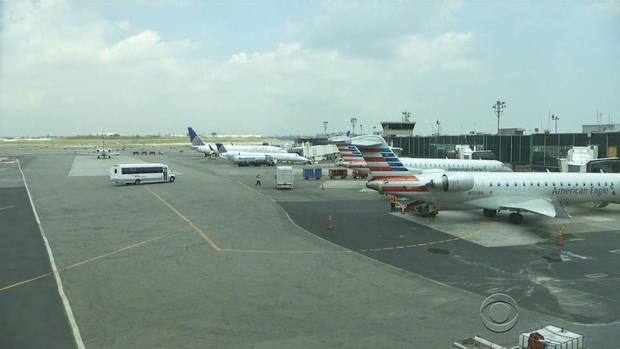Too hot to fly: As temperatures rise, more problems at airports
LOS ANGELES -- More than 40 large wildfires are burning out of control this weekend in at least seven Western states. Many of these fires were sparked by lightning and are now being fueled by triple-digit heat.
This summer, we've also seen how extreme heat can impact air travel. Sometimes it's just too hot to fly -- and a new study says it's going to get worse for air travelers.
Record-high temperatures grounded dozens of planes in Phoenix, where the mercury approached 120 degrees in late June -- too hot for some smaller regional jets to take off.
It's a problem that will occur more frequently at more airports, according to a Columbia University study published in the Journal of Climate Change this week. Researchers predict maximum temperatures at some airports could rise between 7 and 14 degrees by 2080.
"A 5- to 10-degree average increase translates to some serious operational challenges," says commercial pilot Patrick Smith, who runs the website askthepilot.com.
Smith says modern airliners perform best in cooler air that's more dense because it generates more lift. As the temperatures rise, planes need more speed -- and longer runways -- to take off, as well as lighter loads.
"Sometimes the result of all that is -- well, we can't take a full load of people, or we can't take a full load of fuel," Smith says. "You could be prohibited from flying at all."
According to the study, in the future up to 30 percent of flights could face some sort of weight restriction during heatwaves. At New York's LaGuardia, for example, where runways are notoriously short, "a Boeing 737-800 would have have to offload weight half the time during the hottest days."
Smith says a solution could be decades away.
"You can't just slap new engines or new wings on a plane to meet whatever that challenges climate change is going to present,. we're going to have to work this into the thinking into how newer planes are conceived and designed," Smith says.
The record high at LAX is about 110 degrees. The maximum operating temperature for some of the common regional jets is 118 degrees. So if the temperatures rise as predicted, that could cause problems if some of these predictions hold true.





